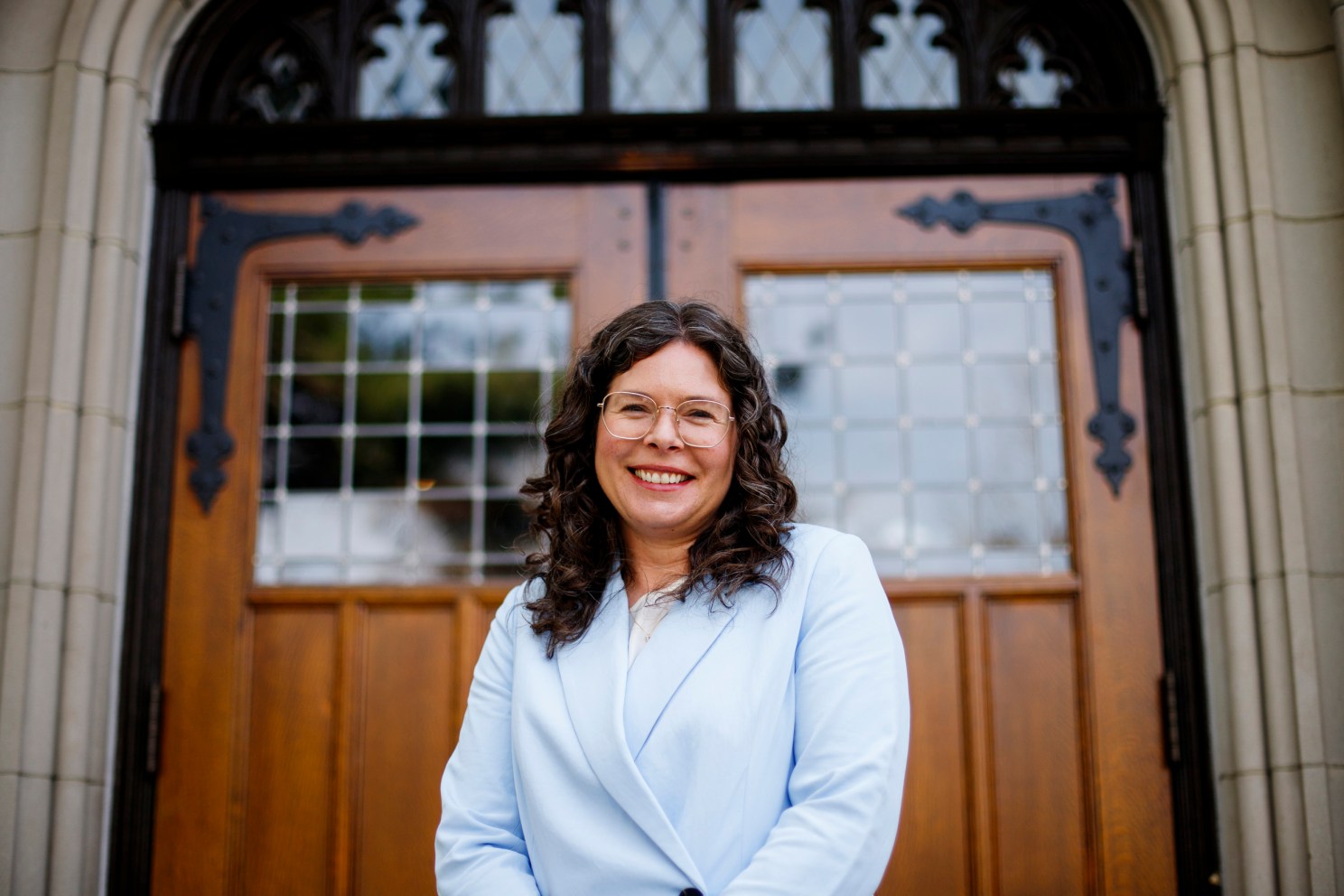
Kelsey Hanson Woodruff.
Photo by Grace DuVal
Searching for answers to life’s big questions
Kelsey Hanson Woodruff served as a Presbyterian minister before love of religious studies led her to Harvard
Part of the Commencement 2025 series
A collection of features and profiles covering Harvard University’s 374th Commencement.
Growing up in a Catholic family in California’s Bay Area, Kelsey Hanson Woodruff’s path from altar girl to Presbyterian minister to scholar of American religion seemed somehow preordained.
“I have always been interested in religion, because to me, the question of why humans are here and how they make meaning is important,” said Hanson Woodruff. “I have always been interested in how religion affects society, and how people’s religious faiths inform how they want society to run, and what kind of a community they imagine.”
“They set an example for me, that your ministry can be lived out in your personal life as well as in the classroom.”
Kelsey Hanson Woodruff
Hanson Woodruff’s Catholic upbringing, and the presence of many educators in her tight-knit family helped her foresee a path in which education and religion could be intertwined. The example of her godparents, who are also her uncle and aunt, Eric Hanson, a former Jesuit priest, and Kathleen Hanson, a former Maryknoll nun, looms large in her life, she said. They met after both had left the church and become college professors. “They set an example for me, that your ministry can be lived out in your personal life as well as in the classroom,” she said.
Still, it was only after taking a class in Buddhism at Stanford that Hanson Woodruff fell in love with religious studies. Drawn by Protestant churches’ policy of ordaining women, she became a Presbyterian minister and served congregations in California, Arizona, and Massachusetts in the years before she came to Harvard.
A Ph.D. candidate in religion with a secondary in anthropology in the Kenneth C. Griffin Graduate School of Arts and Sciences, Hanson Woodruff studies transformations in American Christianity. Her dissertation, a historical and ethnographic study of post-evangelical feminists, explores the impact of digital technologies and societal changes on faith, and underlines her interest in studying progressive religious people.
“In the United States, we often hear only about conservative Catholics, conservative evangelicals, and conservative Christians,” Hanson Woodruff said. “But there are religious people on the left, and there are progressive people within all religious communities. There’s certainly some scholarship on it, but there should be more; there needs to be more public knowledge about that.”
In her fieldwork, much of which took place during the pandemic, Hanson Woodruff researched a number of digital religious communities led by women who were pushing back against conservative streams within evangelical Protestantism. As a millennial, she was interested in how these women leaders were using digital media, including blogs, social media, and digital forums, to explore their Christian faith.
Among the figures Hanson Woodruff studied were Rachel Held Evans, author of the New York Times best-seller “A Year of Biblical Womanhood” (2012); Sarah Bessey, who published “Jesus Feminist” (2013); and Austin Channing Brown, who wrote the best-selling “I’m Still Here: Black Dignity in a World Made for Whiteness” (2018).
As progressive Christian authors, Evans, Bessey, and Channing Brown challenged traditional views within the evangelical church on politics, feminism, anti-racism, and LGBTQ issues, said Hanson Woodruff. Held Evans, who died at 37 in 2019, wrote about how she grappled with her conservative upbringing while questioning long-established evangelical views on the role of women. Bessey asked readers to reconsider whether feminism was antithetical to Christianity. Channing Brown wrote about her experience as a Black Christian woman in white conservative evangelical spaces.
“Many of these women authors are advocating for alternative theologies within conservative evangelicalism.”
Kelsey Hanson Woodruff
“Many of these women authors are advocating for alternative theologies within conservative evangelicalism,” said Hanson Woodruff. “Many of them were raised in churches where women would not be allowed to be pastors or elders or other kinds of leaders. And they’re talking to each other, and saying that that’s not in the Bible, and that’s not what it says. And their readers are reconsidering these things as well.”
Hanson Woodruff’s work will have a significant academic impact, said David Holland, Bartlett Professor of New England Church History at Harvard Divinity School.
“Kelsey’s ability to identify the way technology and culture have converged to create these spaces and opportunities for women’s religious leadership in spaces that have traditionally been reserved for male leadership has been a really important breakthrough in our understanding of the religious landscape of our present moment,” said Holland.
After graduation, Hanson Woodruff plans to pursue postdoctoral studies and publish a biography of Held Evans, which she has been working on for the past few years. In the meantime, she has a few words of advice for those students interested in religious studies. “Young adulthood is a wonderful time to consider the most significant questions of meaning: What makes us human? What is our purpose? And how have other people, in other times and other places, understood the answers to these questions?” said Hanson Woodruff. “Religious studies, and indeed all the humanities, can lead us to consider these things.”




